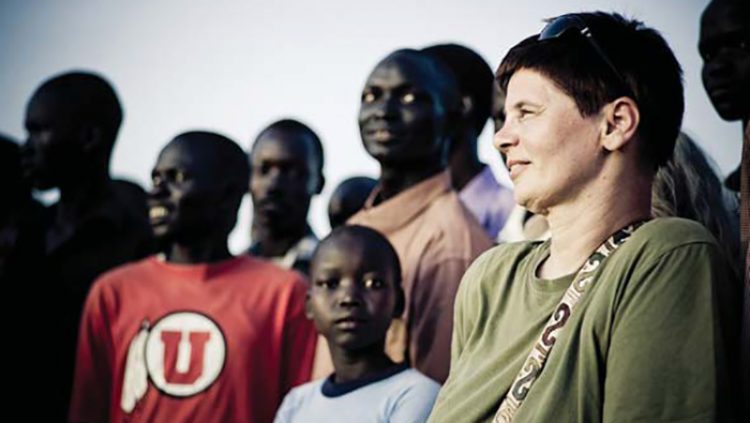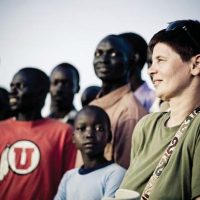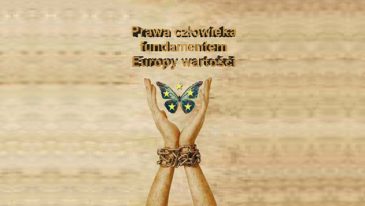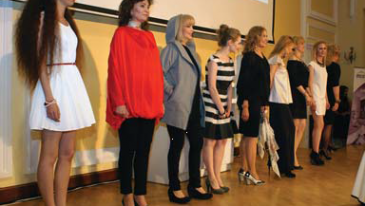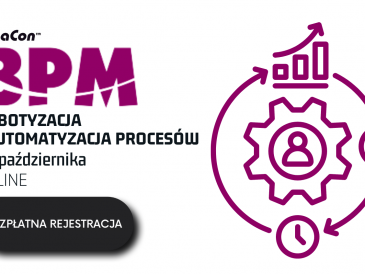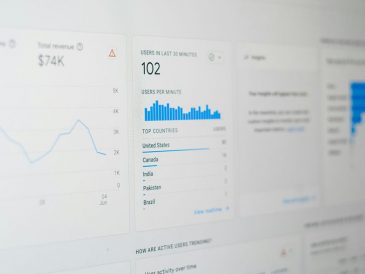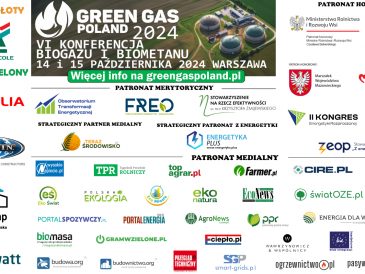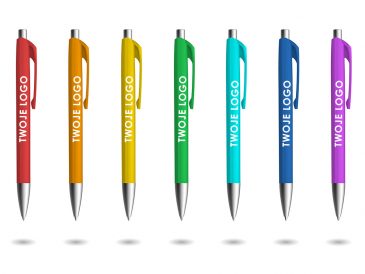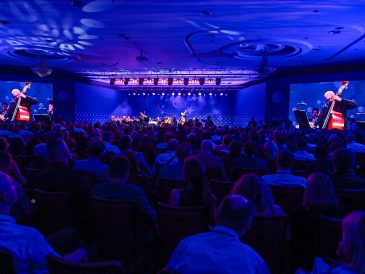I AM CURIOUS ABOUT THE WORLD – an interview with Janina Ochojska
Astronomy helped me in my current job, because it gave me the ability to look at things from a distance, globally. When I see a man who lacks water, I do think about bringing him a full bucket, but I wonder how to solve this problem on a larger scale and provide him with constant access. How can I help the community this person lives in? – says Janina Ochojska, a founder of the Polish Humanitarian Action, a trained astronomer.
Interviewed by IZABELLA JARSKA
 Polish Humanitarian Action is today an already known „brand” with traditions. How did it all start?
Polish Humanitarian Action is today an already known „brand” with traditions. How did it all start?
– Sometimes people ask me if I acted on an impulse. Well, yes and no. I believe that what a person does results from his whole life. I think that even the fact that as a child I went down with polio also has an impact on what I do today. Because I got help from many people and the need to return what I gained from others has always been part of me. Although my life path initially went in a completely different direction since I wanted to be an astronomer and I graduated from the university and worked as a researcher. But I was a witness of the support that Poles were granted under martial law. As I mentioned, I also got huge help, thanks to which today I can walk and I can do what I do. I was treated in France and my treatment was financed by the French Ministry of Health. And, believe me, it was without any contacts. A French doctor who got my dossier decided to write to the French Ministry of Health even without telling me that. And just in France I came into contact with humanitarian organizations and, in particular, with the Equilibre Foundation which was established in order to assist Poland under martial law. And with time I became its volunteer. I was particularly interested in how the organization raises funds. In 1992, during my holidays in France, I learned about the activities of Equilibre aimed at helping Bosnia. It was the action of bringing thousands of Bosnian children and their carers from refugee camps to French families. I volunteered a bit out of curiosity, because I wanted to see how such things are organized. As a consequence, in October 1992 I was in Bosnia, so in the middle of a war. And that was a turning point when it comes to my later activities. I was in the refugee camps, I saw people who had lost everything and did not know when the war would be over. These were mostly women, children, elderly people… They lived in makeshift conditions. Some of them apart from their belongings also lost their loved ones. In Bosnia I was with people from the foundation who once had helped my country. I thought that also I should do something – on my own behalf because I experienced help, and on behalf of my country. I decided that after returning to the country I would organize a convoy from Poland to Sarajevo. Then it seemed easy, but, in fact, it was not like that. However, I believed that it was possible. Here I must say that I found out – and this is my greatest life experience – that if a man wants something very much and believes in this, this thing is going to happen. In my case it was so that my friend directed me to Radio Three to talk about Bosnia and mention my intentions to organize a convoy. I went to the radio at first to make an appointment of my radio appearance. A journalist, Tomek Kowalczewski, told me that right at that moment there was the time on the air. So I told in the studio about what I had seen in Sarajevo, and at the end of the programme I mentioned my plans to organize a convoy. I also gave the phone number of one person. Immediately after the programme, I called her to apologize for giving her phone number in public and I could no longer get through. Because the Poles were at that time ready to help Bosnia, but they did not know how to do it. They needed someone to say: I will do it. And I said it on the air. Although I did not yet know how to do it. This only one programme and my declaration triggered such human energy and willingness to help that later a lot of things happened almost spontaneously. Other media took up this topic, we organized the first convoy and a large number of journalists went with us to Sarajevo. Later, a lot was written and spoken about it in the media, so there was so much information on this topic that virtually everyone for whom the war in Bosnia was the focus of concerns and who wanted to do something about this, knew that there was such a possibility. And that is how it all started. Then I was not thinking at all to build any organization. I thought that I would organize one convoy and come back to my work as an astronomer, because it was my dream occupation. But when we came back from Sarajevo it turned out that in the meantime, a lot of gifts had been collected and one had to go with the second convoy. Then there were more trips and after a year we became an institution. In 1994 a war broke out in Chechnya and people started calling us no to ask whether we organize convoys there, but where to put money and bring gifts. Undoubtedly, my decision to dedicate to this cause was also affected by the fact that in December 1993 – exactly a year after my first trip to Sarajevo with a convoy – I received the title of a Woman of Europe, given to me by the European Community for an activity for Bosnia. This event attracted great media attention and then it was already easier to develop our activity. I would like to point out, however, that at this time we do not organize convoys any more. We are a professional, developmental organization dedicated to humanitarian aid. The point is not that convoys are unprofessional. However, aid and its forms should provide the opportunity to develop, and we are already at such a stage that we can offer it to people.
How did you and do you cope with your own sensitivity while going to regions engulfed by war and coming into contact with various forms of human misery?
– I think that my disability, I have been struggling with since my childhood, helped me in some way. I had friends who were more disabled than I am. I grew up in such communities, and for me so called misfortune was in some way the norm. At the same time, I was a very happy child. This certainly formed my character in some way. And it allows me in such places, which you are taking about, to look not at what I cannot do, but at what I can do. There are the multitudes of people in the world who do not have access to water. I cannot help everybody. But I can, and I have been doing this, build wells in Africa helping at least some of them. One should be aware that the aid also raises some hope. The help should be therefore such that people could know what to expect. There must be set clear criteria. And one needs to stick to these criteria. Therefore, this work requires a lot of empathy, but also assertiveness. Because, paradoxically, it is so that the humanitarian employee must be able to refuse aid because not everything can be done. Giving help involves making choices and this choice sometimes hurts. However, if we look at it in terms of how much we can do, then such a choice already looks different. We just set ourselves further tasks.
- Janina Ochojska in the Southern Sudan, where PAH has been building wells for years
You are a non-governmental organization, which probably could not exist without donors, both private and those who have companies. How business people can support, let us call it „systemically”, Polish Humanitarian Action?
– Our cooperation with companies has undergone different kinds of evolutions. But when I were going with convoys, we needed just specific products that companies gave us in the form of gifts. Now we basically do not accept such a support. Therefore, our cooperation with companies has now been completely transformed. Its forms are very different: for example, donation services, financial donations, loyalty programs and socially oriented marketing. Our latest project – Club PAH SOS Business – creates further opportunities for such cooperation. What does it consist in? Well, PAH SOS Business Club was established for the purpose of humanitarian aid actions. The idea behind is that if somewhere in the world there is happening a humanitarian disaster, help is need immediately. We do not want to waste time collecting money when people are already in need of support. Therefore, we would like to have funds at hand that we could make available at once. Of course, we carry out a public collection, we ask Polish society for support, but at the time of a disaster we need constant money, which we can immediately dispose of. PAH SOS gives us such an opportunity. Club members, paying fixed donations, create for us such a capital in the event of a humanitarian disaster, not knowing in advance which aid the money will be spent for. Will it be the Philippines or maybe Haiti? But all donors are later informed what the money was spent on. We are sure that our club members are aware that they are building a permanent aid mechanism. It happens that companies. especially small and medium, would like to help and at the same time build their positive image, but they often do it chaotically and occasionally. By means of PAH SOS Business Club we give an opportunity for their social commitment to function systematically and efficiently and to become a great benefit for the company image. Let us imagine that any company wants to be involved in the help, but cannot afford such a donation for, for example, the construction of the well, because it is the amount of tens of thousands of dollars. The PAH SOS Business Club gives an opportunity to contribute to the cost, thanks to which this well or a house on the housing estate for the refugee will be built. Then the company has a sense that together with five other donors it contributed to the fact that a thousand people have access to water. It is very good for its image. Often, according to our experience, it also consolidates a lot employees who can see it and feel proud because of the fact that their company is committed to a meaningful action. There are also other forms of cooperation. With some companies we have partnership agreements. Sometimes of many years’ standing, such as with BPH, BZ WBK, DHL and BP, and until recently the LOT. For us, however, as for the organization, these forms of cooperation mean financial stability and predictability, which greatly facilitates our work. Thanks to the ongoing support it is better planned and more efficient. Sometimes I also work with a company on the basis of a grant offer services and not money. It is how we cooperate with, for example, Microsoft.
Can a potential member of the club also offer a service instead of monetary contributions?
– So far there is no such a possibility. PAH SOS Club is a financial fund. However, if a company came to us and it put forward a specific deal on something that we needed, I do not think that we would refuse to cooperate. For example, we need printing services. We do not make any huge number of leaflets or posters, because we economize on such things, but like any organization we sometimes have some needs related to it. The partnership with a printing company would probably be interesting and useful for us. However, if someone wanted to offer us cooperation involving the settlement in the form of shoes, even if these were the most beautiful and of the best brand, it would not be useful for our activities.
Have you ever had „Count of Monte Cristo,” or a donor, who wished to remain anonymous in his charity?
– There were such cases. For example, one couple gave us a million zlotys for the construction of wells in the southern Sudan. And in the whole foundation only a few people needed to deal with individual donors know the name of this couple. In the accounts they are presented under the name „Kopernik”, as these donors wanted the wells funded by them to have the names of great Poles. Therefore, in the southern Sudan we have wells named Curie- Słodowska, Słowacki, Kopernik and so on.
Working for humanitarian aid is probably very absorbing. Do you have time for fun? Do you as a born and trained astronomer sometimes look at the stars?
– When it comes to astronomy, I follow the news on this subject. Especially that the current technological development gives a lot more possibilities to process the picture and observe the cosmos than ever before. It also allows to specify the theory of the universe creation, which has always been my passion. I look at the stars the most often when I am away from home, somewhere in the field, for example, in the Sudan or Chechnya. In Warszawa or Kraków, where I live, it would be difficult to observe the sky. However, if today I wanted to return to the professional astronomy, probably I could not do it. Because I am already lagging behind in relation to the changes that have occurred in this area. But I have to admit that astronomy has helped me in my current job, because it gave me the ability to look at things from a distance, globally. For example, when I see a man who lacks water, I do not think that I have to bring him a full bucket, but I wonder how to solve this problem on a larger scale and provide him with constant access. How to help the community in which the person lives? Thus, astronomy has come in handy. Also in terms of logical thinking, which is required by science subjects.
What about more mundane passions? Reading, cooking, music …?
– I like cooking, and I even think that I am good at it. But I rarely cook, rather occasionally. I probably would not like such typical daily rustling up. But cooking something from time to time, for friends, is a great pleasure for me. I listen to music often, mostly classical, created till the Baroque period. I read a lot. I spend almost all free time reading, I also spend time doing it when I am travelling. I especially read books on history, but also on what I do, so for example, the countries assisted by the Polish Humanitarian Action. All in all, I am curious about the world and books partially satisfy my curiosity.
Janina Ochojska a founder and president of the Polish Humanitarian Action. She is the winner of many prestigious awards, she received, for example, the distinction of POLCUL Foundation of Australia, the title of "Women of Europe 94" awarded by the European Community in Brussels, Saint George's Medal of "General Weekly", Pax Christi International Peace Award, Atsushi Nakata Memorial from Japan, the Jan Karski Award For Courage and Heart of the American Cultural Center and Freedom House in Washington, the Order of the Legion of Honor awarded by the President of the Republic of France and the Traveller Grand Prix.

